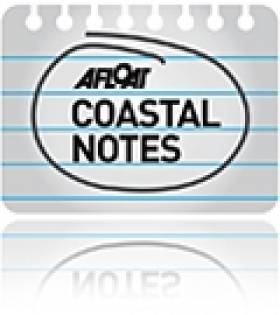Displaying items by tag: Shot Head
Inland Fisheries Ireland Seeks Judicial Review of Decision to Grant Bantry Bay Aquaculture Licence
Inland Fisheries Ireland (IFI) has confirmed that it is seeking a judicial review into the granting of an aquaculture licence for Atlantic salmon at in Bantry Bay.
As the matter is due before the High Court tomorrow, Tuesday 28 September, and the State agency with responsibility for the protection and conservation of freshwater fish and habitats says “it will not be possible…to make any further comments at this stage in the process”.
As previously reported on Afloat.ie, a licence was granted by the Aquaculture Licences Appeals Board this summer — following a protracted appeals process over several years — to Mowi Ireland for an 18-pen facility at Shot Head in Co Cork.
TheJournal.ie reports that Ireland’s largest operator of salmon farms has been granted a licence for an 18-pen facility in Bantry Bay.
Nine years ago Afloat.ie noted proposals for the salmon farm at Shot Head, with local campaigners arguing then that Bantry Bay had reached its capacity for aquaculture.
Following a protracted appeals process over several years, Mowi Ireland has now been given the go-ahead to harvest as much as 2,800 of salmon every two years.
However the proposals remain strongly opposed by locals, environmental groups and even State agency Inland Fisheries Ireland, with concerns over the impact of salmon farming on marine biodiversity.
TheJournal.ie has more on the story HERE.
Meeting for Bantry Bay Fish Farm Opponents Tonight
#COASTAL NOTES - Bantry Bay has reached its capacity for salmon farming, says the committee formed to oppose a proposed new facility at Shot Head.
Save Bantry Bay has called a public meeting for supporters tonight (24 March) at Eccles Hotel in Glengarrif, Co Cork, starting at 8.15pm - where chairman Kieran O'Shea will give a presentation on the group's "wide-ranging objections", as The Fish Site reports.
Minister for the Marine Simon Coveney is currently considering the licence application for Marine Harvet's proposed salmon farm at Shot Head in Adrigole.
Concerns among the committee's members include the potential spoiling of the area's natural beauty having a knock-on effect on tourism, and the environmental consequences of algae blooms from nitrogen and phosphorous waste.
Local fisherman fear that a fish farm of more than 100 acres would see the closing off of part of an "important ground for shrimp and prawn".
Possible infection of wild salmon in local river systems by sea lice from farmed salmon is also an issue, with the Environmental Impact Statement for Shot Head highlighting an outbreak of lice at Marine Harvest's facility in Roancarrig two years ago.
The Fish Site has more on the story HERE.
- Coastal Notes
- Fishing
- Bantry Bay
- Co Cork
- fish farm
- salmon farm
- Shot Head
- Adrigole
- Glengarrif
- Eccles Hotel
- Save Bantry Bay
- Minister for the Marine
- Simon Coveney
- Marine Harvest
- tourism
- environment
- algae blooms
- nitrogen
- phosphorous
- waste
- shrimp
- prawn
- infection
- Wild Salmon
- sea lice
- environmental impact statement
- Roancarrigh





























































